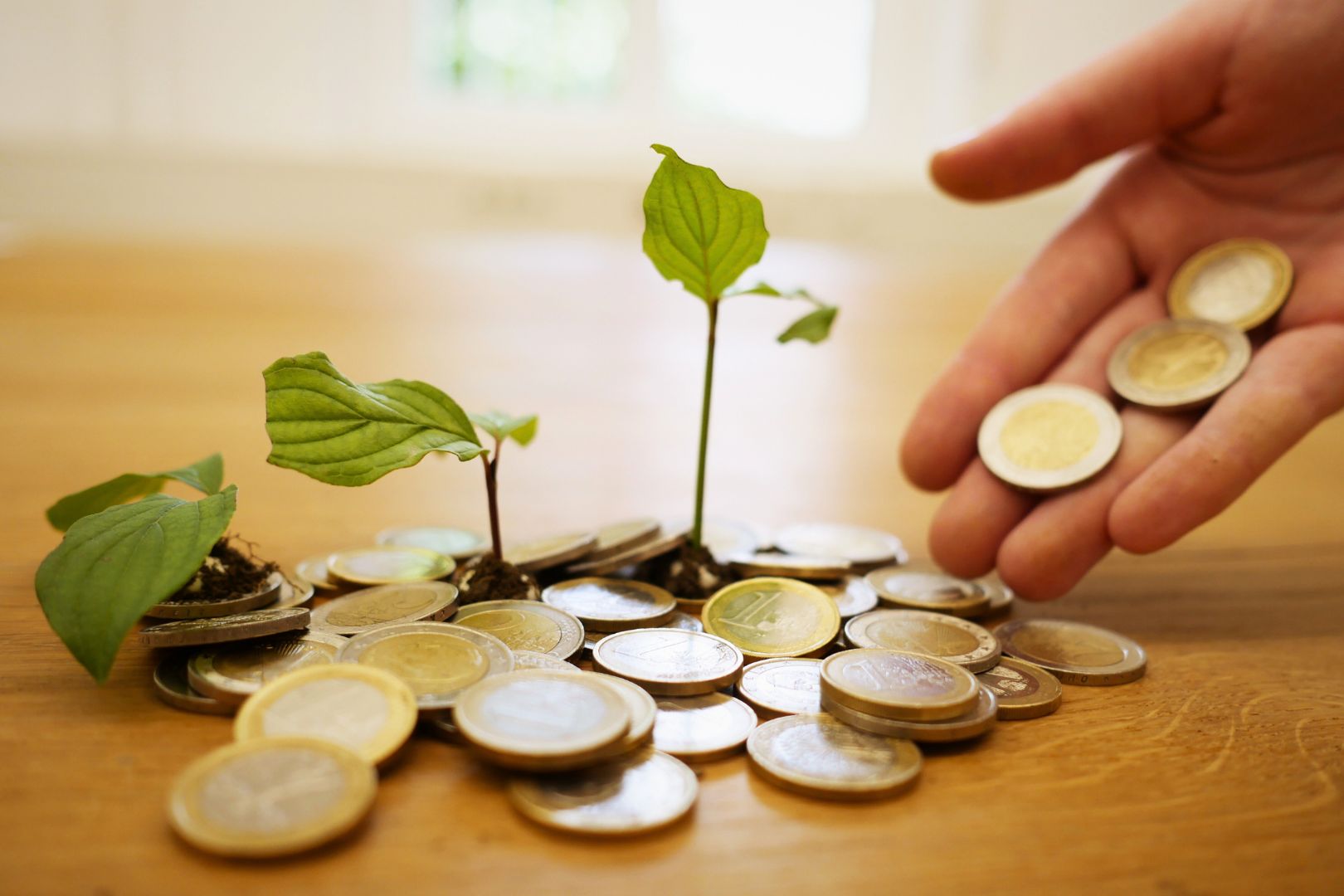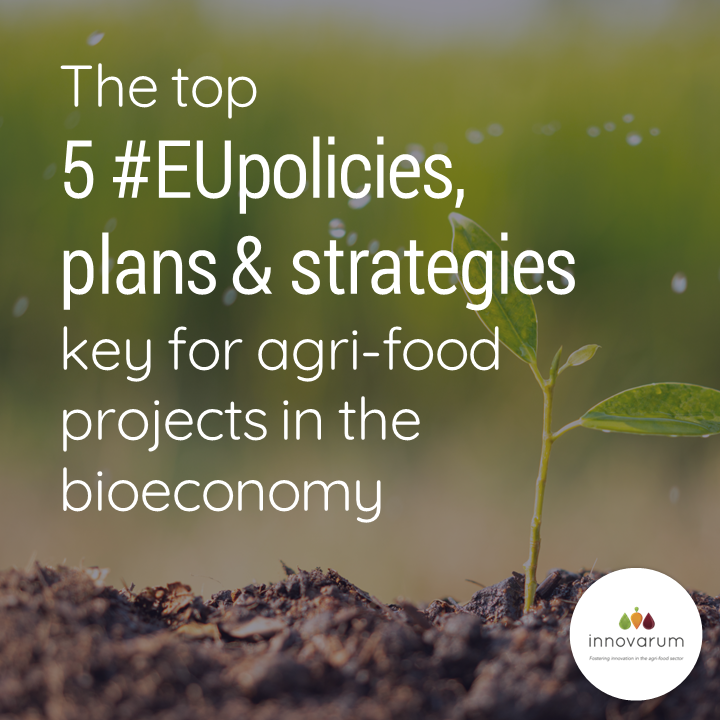Newsletter
About the Author: Innovarum
EU Projects are determined by policies and plans seeking to achieve strategic EU objectives in specific areas. Being aware of these policies and plans is key when preparing a project and very especially during the proposal writing process. A clear understanding of the policy environment of the specific program and topic to which our project is addressed will largely increase our possibilities of success.
In this post, we will identify and describe the most relevant policies and plans for EU projects within the agri-food and bioeconomy sector:
The European Green Deal (EGD)
The EGD aims to promote sustainable growth by transitioning to a modern, resource-efficient, and competitive economy.
It is composed of a set of policy initiatives with the overarching objective of making the EU climate neutral by 2050 and decoupling economic growth from resource use. The most important ones with regards to agri-food and bioeconomy related projects are described below:
- Farm to Fork (F2F) Strategy: Within the EGD, the F2F Strategy aims to accelerate the transition to a sustainable food system which is fair, healthy and environmentally friendly. Key pillars of this strategy are the prevention of food lost and waste, the sustainable food production, the sustainable food processing and distribution and the sustainable food consumption.
- The EU’s circular economy action plan (CEAP) is one of the main blocks of the EGD. It aims to reduce pressure on natural resources while creating sustainable growth and jobs. Among its objectives, it seeks to ensure less waste and make circularity work for people, regions and cities.
- The zero-pollution action plan, also part of the EGD strategy, aims to reduce air, water and soil pollution to levels not considered harmful to health and natural ecosystems. Key targets include a significant reduction of waste generation and specifically halving residual municipal waste.
- The Biodiversity strategy for 2030 aims to protect nature and reverse the degradation of ecosystems, recovering them for the benefit of the people, climate and the planet. The Biodiversity Strategy is EU’s contribution to the upcoming negotiations on the global post-2020 biodiversity framework. It also supports a green recovery following the Covid-19 pandemic.

The European Green Deal: structure
The bioeconomy strategy
The bioeconomy strategy aims to accelerate the deployment of a sustainable European Bioeconomy through 5 main areas of action:
- Food and nutrition security.
- Natural resources sustainability.
- Reduced dependence on non-renewable, unsustainable resources.
- Limitation and adaptation to climate change.
- Increased European competitiveness and more jobs.
The strategy is implemented by means of an action plan focused on strengthening and scaling up the biobased sectors, unlocking investments and markets, deploying local bioeconomies rapidly across the whole of Europe and understanding the ecological boundaries of the bioeconomy.
Food 2030
In line with the objectives of the EGD, F2F and Bioeconomy strategies, Food 2030 is the EU’s research and innovation policy to achieve a resilient EU food system that guarantees people’s health and environmental protection.
The objective of Food 2030 is to reach the following key food and nutrition goals:
- Nutrition for sustainable and healthy diets
- Food systems supporting a healthy planet.
- Circularity and resource efficiency.
- Innovation and empowering communities.
To achieve these goals, Horizon Europe will support key actions offering answers to Food 2030 priorities.
The Soil Strategy for 2030
Already discussed in a previous blog post, the Soil Strategy for 2030 aims to protect and restore soils, ensuring they are used sustainably.
The Common Agricultural Policy (CAP)
The EU’s Common Agricultural Policy (CAP) is one of the founding policies of the original Common Market. It supports farmers and ensures food security. It was reformed in December 2021 to become fairer, greener and more performance-based. The new CAP is due to begin in 2023 and is intended to become a key tool in supporting the EGD and, more specifically, the F2F and Biodiversity strategies.
The policy focuses on the following objectives:
- to ensure a fair income for farmers;
- to increase competitiveness;
- to improve the position of farmers in the food chain;
- climate change action;
- environmental care;
- to preserve landscapes and biodiversity;
- to support generational renewal;
- vibrant rural areas;
- to protect food and health quality;
- fostering knowledge and innovation.

The CAP 10 objectives – Source: EU Commission

This article has been prepared by Chema Castellano, Innovarum´s Senior Proposal Writer
Previous posts

Ensuring an accessible bioeconomy: MainstreamBIO digital toolkit
Adopting the bioeconomy may feel a lonely journey, but it is not! Plenty of people have already implemented bioeconomy practices and initiatives. MainstreamBIO has developed a digital toolkit to help you learn about existing [...]

Innovarum attends the General Assembly of Like-A-Pro in Wuppertal, Germany
Our colleagues from Innovarum Adrián Escribano and Ana Díaz attended the General Assembly of LIKE-A-PRO, held at Codeks Factory in Wuppertal on April 9th and 10th, 2024. As pioneers in innovative solutions, we were [...]

Horizon Europe Cluster 6 calls: Insights and Recommendations for applicants
In our previous blog post, we delved into the success rate and average budget of the first 2024 call for proposals within Cluster 6, whose last deadline for submission was on 28th February. In [...]

Closure of Horizon Europe Cluster 6 Calls: Assessing the Impact
On February 28th, the latest round of calls for proposals under Cluster 6 of Horizon Europe ended. In this blog post, we delve into the success rate and average budget of the 2024 first call [...]

Innovarum participates in the KOM of OrganicClimateNET
Last 27th of February took place the Kick off Meeting (KOM) of OrganicClimateNET in Fulda, Germany. Innovarum was present as one of the partners of the project. A more organic Europe Recognising the key [...]

Tips to improve your EU project social media
If you want to improve your project's social media, you need a plan. Here are some tips to gain visibility, generate traction and increase your subscribers on social media: Know your target Not everyone uses [...]
#WeMakeInnovationHappen
Do you have an innovative idea for a project? Are your looking for project management support? Do you need a Dissemination and Communication Partner?

